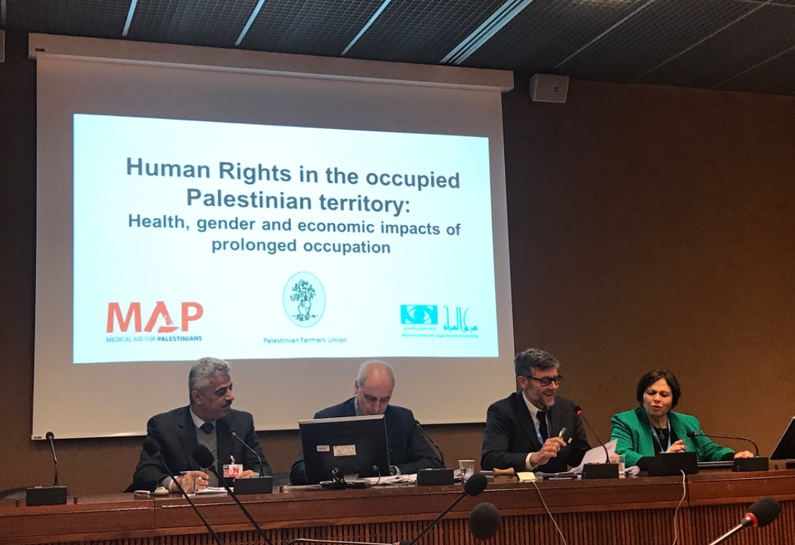UK opposes key accountability resolution at UN Human Rights Council

Item 7 discussions began on Monday, with the presentation of the latest report from the UN Special Rapporteur on the situation of human rights in the Palestinian Territory occupied since 1967, Professor Michael Lynk. This report focused on the right to health of Palestinians living in the West Bank, including East Jerusalem, and Gaza, and assessed barriers to the movement of patients; de-development of health infrastructure; continuing impunity for attacks on healthcare professionals; and specific issues relating to the health and wellbeing of children and persons with disability. Professor Lynk concluded that, with regard to Israel’s obligations under International Humanitarian Law, it is “in profound breach of the right to health with respect to the Occupied Palestinian Territory.”
MAP was the first civil society organisation to speak in the interactive dialogue with the Special Rapporteur which followed. In a statement, MAP’s Director of Advocacy and Campaigns, Neil Sammonds, welcomed the report and underlined that though many states support Palestinians with aid and development assistance, this “appears to be inadequately matched with commitment to demanding the adherence to international humanitarian and human rights law which would sustainably promote and protect Palestinians’ right to health.” MAP called on UNHRC Member States to:
- Ensure accountability for all violations of international law, including attacks on medical infrastructure and personnel;
- Demand that Israel remove the obstacles to free movement which undermine health, healthcare and development; and
- Take action to end the occupation and the unlawful blockade and closure of Gaza.
Our well-attended side event on Tuesday focused on the health, gender and economic impacts of prolonged occupation, with presentations from UN Special Rapporteur Michael Lynk, as well as Randa Siniora, General Director of the Women's Center for Legal Aid and Counselling (WCLAC), and Abbas Melhem, Executive Manager of the Palestinian Farmers Union (PFU).
Professor Lynk began by describing the findings of his report on the right to health, and outlining Israel’s obligation – as the occupying power – to work to progressively realise the right to health of the Palestinian population, as well as protecting marginalised peoples and providing and enhancing underlying social determinants of health. Abbas Melhem described the impact of the occupation on access to water resources and agricultural land, and Randa Siniora spoke about the specific impacts of the occupation on the health and wellbeing of women. You can read a short overview of the event on Twitter here.
Voting under Item 7: Human rights in the occupied Palestinian territory (oPt)
While in Geneva, MAP also held meetings with Permanent Missions of UN member states, encouraging them to support resolutions coming under Item 7 which are rooted in fundamental principles of international humanitarian and human rights law, including the right to health, and accountability for violations thereof. The four recurring resolutions under this agenda item focus on settlements; self-determination of the Palestinian people; ensuring accountability for violations of international law; and the human rights situation in the oPt.
At last year’s March session, the UK stated that they were “putting the Human Rights Council on notice,” and threatened to “adopt a policy of voting against all resolutions concerning Israel’s conduct in the Occupied Syrian and Palestinian Territories” over perceived anti-Israel bias in the council. At that time, they supported resolutions on human rights situation and self-determination, and abstained on resolutions on accountability and settlements. On Friday, the UK again abstained on the settlements resolution, despite having raised concerns about settlements at Israel's recent Universal Periodic Review, and for the first time voted against the resolution on accountability.
Ultimately, with the UK’s new opposition, all four resolutions passed with the following tallies:
- Human rights situation in the oPt: For 43 – Against 2 – Abstain 1
- Self-determination of the Palestinian people: For 41 – Against 2 – Abstain 3
- Settlements: For 34 – Against 4 – Abstain 8
- Ensuring accountability for violations of international law: For 27 – Against 4 – Abstain 15
As outlined in our briefing to UNHRC member states, accountability for violations of international law in the oPt is essential to the protection of healthcare facilities and personnel from attack. Successive Israeli military operations in Gaza between 2008 and 2014 saw 147 hospitals and primary health clinics and 80 ambulances damaged or destroyed, and 39 medical workers killed. The Israeli Government has failed to adequately cooperate with international investigations, and denied members of the UN Commission of Inquiry (COI) entry to Gaza to investigate alleged violations after the 2014 military offensive. The COI expressed concern about “a number of procedural, structural and substantive shortcomings” in Israel’s military investigation system.
In 2017, the Palestine Red Crescent Society recorded 22 attacks on its ambulances, and 27 injuries to paramedics across the whole oPt, with the majority occurring at protests. They also recorded 33 cases of obstruction to the movement of ambulances. In July, Israeli security forces raided Al Makassed Hospital in East Jerusalem twice. They used violence against medical staff, hospital employees, and visitors. In at least one case, Israeli forces disrupted the medical treatment of a seriously injured patient receiving care at the hospital.

